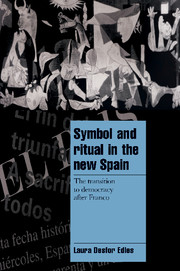Book contents
- Frontmatter
- Contents
- List of tables
- List of figures
- List of abbreviations
- Acknowledgements
- Map of Spain
- Part I Interpreting the Spanish transition to democracy
- 1 Introduction
- 2 Theories of transition and transitions in theory
- 3 Spain: a history of divisions and democracy
- Part II The symbolic basis of Spanish consensus
- Part III Conflict and consensus in the institutionalization of Spanish democracy
- Notes
- References
- Index
2 - Theories of transition and transitions in theory
Published online by Cambridge University Press: 06 July 2010
- Frontmatter
- Contents
- List of tables
- List of figures
- List of abbreviations
- Acknowledgements
- Map of Spain
- Part I Interpreting the Spanish transition to democracy
- 1 Introduction
- 2 Theories of transition and transitions in theory
- 3 Spain: a history of divisions and democracy
- Part II The symbolic basis of Spanish consensus
- Part III Conflict and consensus in the institutionalization of Spanish democracy
- Notes
- References
- Index
Summary
Since the Second World War, analysts have taken basically four different approaches to the issue of democratization. In the 1950s and 1960s, political cultural and modernization perspectives were dominant; in the next decade, neo-Marxist and structural models largely replaced modernization models; and since the 1980s, elite and rational choice models have been increasingly popular. This chapter critically examines the theoretical orientation of these three perspectives, focusing on recent elite and rational choice models of transition, and the case of Spain. In the latter portion of the chapter, I introduce a fourth model, which explicitly seeks to rectify the theoretical dilemmas of earlier perspectives. This model is part and parcel of the burgeoning new interest in culture in political sociology, as well as in the social sciences and humanities in general.
Sociological theory after the Second World War: the functionalist–structuralist divide
In the 1950s and 1960s, structural functionalism was, in many respects, the theoretical modus operandi of sociology. Propelled by the work of Parsons and Merton, functionalists portrayed society as an intelligible system, a sum of symbiotically connected parts. Structural functionalism emphasized the existence of common value systems in societies, and the social mechanisms that maintain consensus. In the 1970s, Marxist-inspired analysts challenged the functionalist hegemony. Parsons was dethroned, and functionalism became known as a conservative apology for liberal capitalism. Structure replaced culture at the center of society; and politics was viewed as conflict over material resources, rather than the construction and maintenance of a shared system of values.
- Type
- Chapter
- Information
- Symbol and Ritual in the New SpainThe Transition to Democracy after Franco, pp. 11 - 25Publisher: Cambridge University PressPrint publication year: 1998

